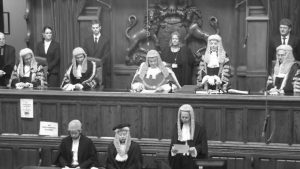Fact, Issues and decision of the court in R V princewill: Marriage is quite common in almost all societies in the world, the ceremony has been in existence from time immemorial. All the major religious of the world Christianity, Islamic, Hindu etc all recognize the ceremony of marriage and they have laid down rules and regulations on how the ceremony of marriage should be conducted.
Islamic religion have strict rules when it comes to marriage, given that adultry is punishable as a criminal offense in the countries that have adopted sharia law as thieir basic law. The Islamic religion also allows a man to marry up to four wives so long as he can afford to provide for all them, this is in great contrast to the Christian religion that only allows for their to be a marriage between one man and one woman.
The countries of the world have also enacted laws that regulate the institution of marriage as well as the dissolution of the said marriage. Countries like the United Kingdom which has long been regarded as Christian countries have strict laws to prevent polygamy, these laws seek to prevent a situation where a man who has previously contracted a marriage under the marriage act marries another woman under the act.

Recommended: Countries where Abortion is Legal Around the World
In Nigeria there are similar laws preventing the a man who has previously contracted a marriage under the law from entering into another marriage with another woman. This is known as bigamy laws.
Bigamy has been said to be a direct subset of polygamy, it can occur in two known ways, when a man who has previously contracted a marriage under the law or marriage act enters into another institution of marriage with another woman under the same law or marriage act as the first marriage. It can also occur as polyandry where a woman who has previously contracted a marriage under the law or under the marriage ordinance enters into another institution of marriage with another man who under the same law or marriage act as the first marriage.
Bigamy is said to be the direct opposite of monogamy, which is the marriage of one man to one woman as often promoted by the Christian religion. The black law dictionary has defined bigamy is the marriage of one person or individual to another person or individual while still legally married to another person. Bigamy is generally a criminal offense in Nigeria. In the southern part of Nigeria, it is regulated by the criminal code. It is also regulated by the penal code in the northern part of Nigeria.
Also see: Advantages and Disadvantages of Being a Lawyer
The criminal code which regulates bigamy in the southern part of Nigeria, provides for it in the S370 of the criminal code. The section states that any person who contracts a marriage under the law and during the life of his/her spouse contracts another marriage he/she would be guilty of an offence and if found guilty would be liable to 7 years in prison. Section 384(1) of the penal code provides for the offence of bigamy in the north and it is quite similar to the provision the south. The only difference happens to be that the penal codes gives the option for a fine to be paid.
Most marriages in Nigeria are conducted under the marriage act, the act in question only recognizes monogamous unions meaning that if an individual who was married under the act proceeds to contract another marriage with a different person, he or she would be liable for bigamy and could be prosecuted and convicted accordingly. In Hyde v Hyde the court gave one of the most widely accepted definitions of marriage, when it stated that marriage was the union of one man and one woman voluntarily entered into for life to the exclusion of all others.
The marriage act clearly restricts the offense of bigamy and equally penalizes it in S35 of the marriage act. The section seeks to prevent an individual who has been married under the act from entering another union with another person.
In Nigeria, one of the only known cases of bigamy is that of R V Princewill. The case involved man who had contracted a marriage under the marriage act when he was a Christian and when he became a moslem he equally contracted another marriage under Islamic law. The case is analyzed below.

Recommended: Facts, issues and decision of the court in Roe v Wade
Issues raised in R V Bartholomew Princewill
What constitutes the offense of bigamy?
Also see: How to Properly Enter Appearance in Court
Facts of R V Princewill
The case in question involved a certain Bartholomew princewill who in the year 1950, married a certain woman in a church. At the time he contracted the first marriage he was still a Christian. When he became a moslem, he equally contracted another marriage with a woman named Fatima, this took place in 1960.
The court while examining the case brought before it, stated that there must be the existence of a yet to be terminated marriage for the crime to be committed that is to say that there must be two marriages in existence.
The court held that both spouse must be living so that one of them may marry another person, and that the second marriage entered into by one of the spouse will be null and void. Following the provisions of section 370 anyone who is convicted of bigamy ought to serve 7 years in prison but in most cases the court usually goes for a lesser sentence. The court in the case of R V Princewill sentenced him to one month in prison.

Recommended: Case Summary of Donoghue v Stevenson
Decision of the Court in R v Bartholomew Princewill
The case involved a certain princewill who in 1950 married a woman in a church. The said princewill married another woman in 1960 when he became a Muslim. The second woman name was Fatima, this act was in clear contravention of the section 370 of the criminal code.
The court in the case stated that the second marriage must take place during the lifetime of the first spouse for the crime to be bigamy. The court then proceeded to sentence the defendant princewill to a month in prison. The law on bigamy provides for a 7 year sentence but judges usually go for lesser sentences.

Edeh Samuel Chukwuemeka, ACMC, is a lawyer and a certified mediator/conciliator in Nigeria. He is also a developer with knowledge in various programming languages. Samuel is determined to leverage his skills in technology, SEO, and legal practice to revolutionize the legal profession worldwide by creating web and mobile applications that simplify legal research. Sam is also passionate about educating and providing valuable information to people.